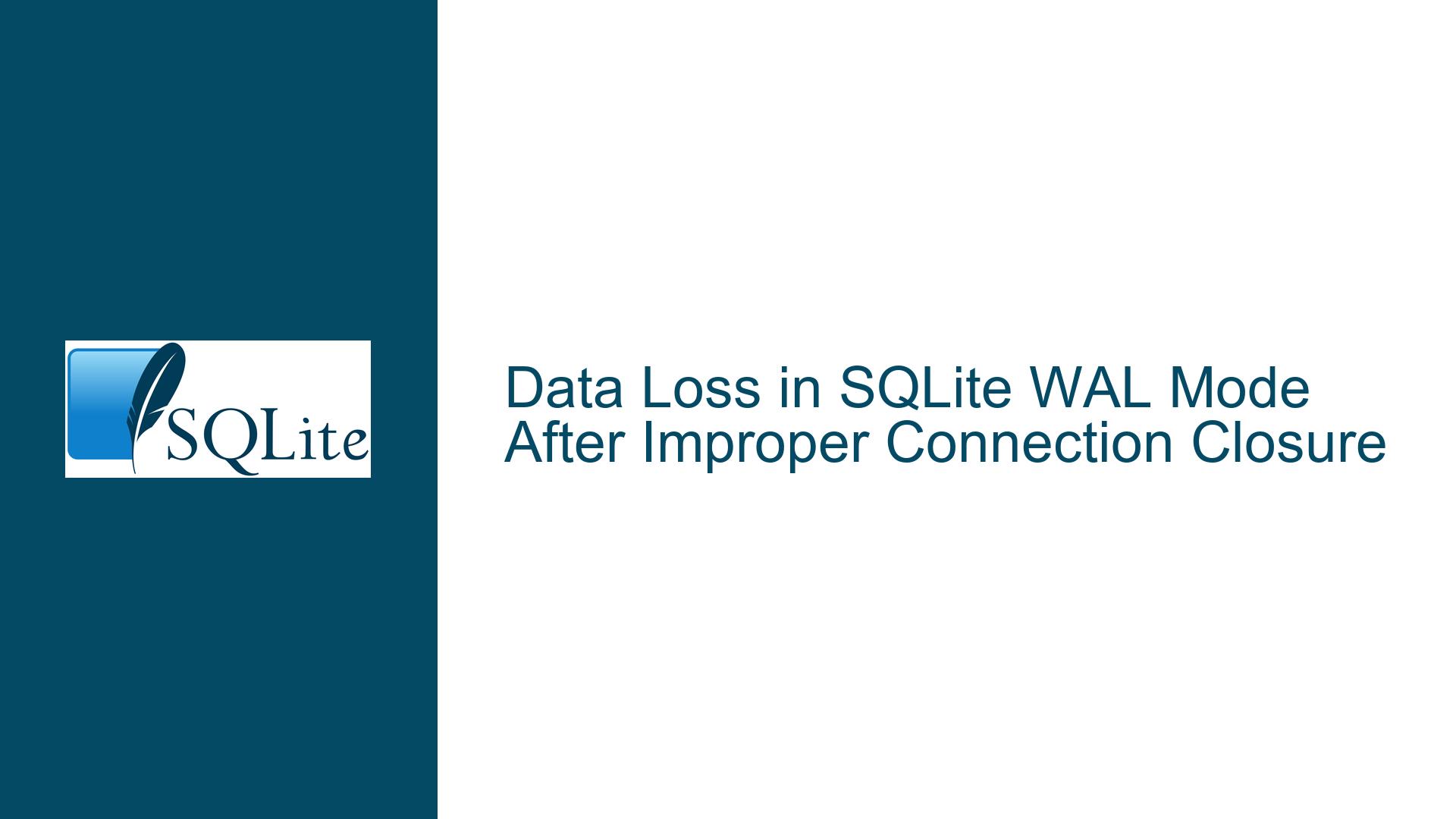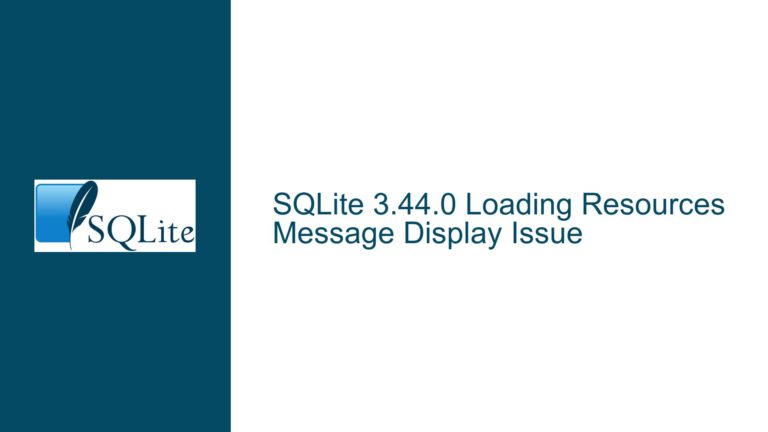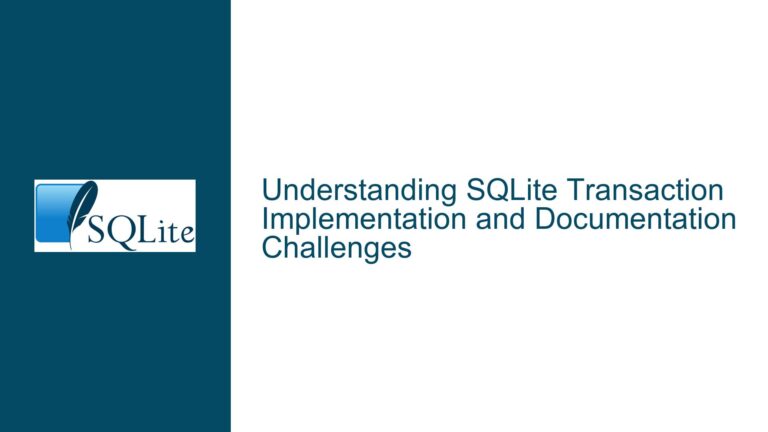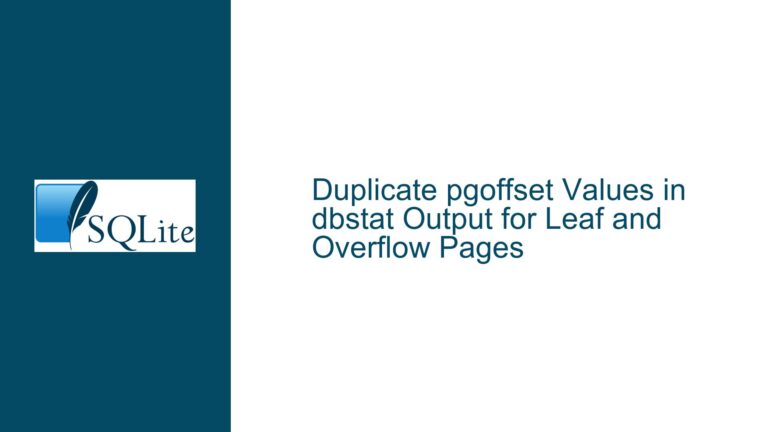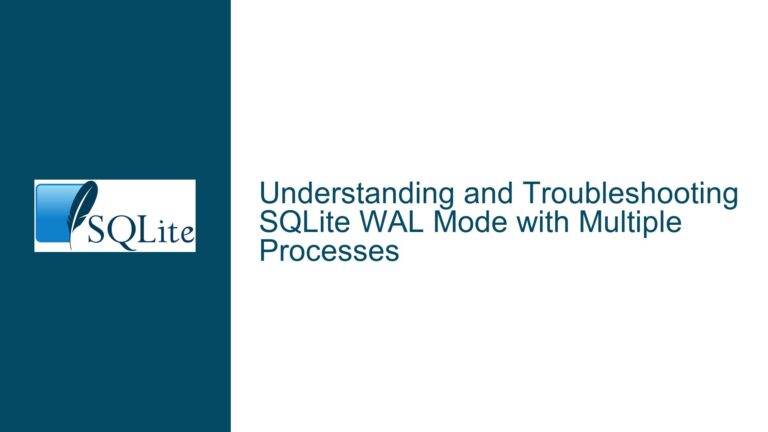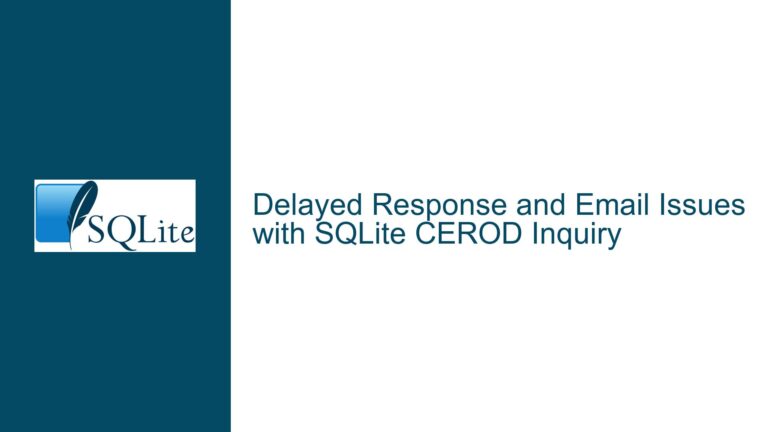Data Loss in SQLite WAL Mode After Improper Connection Closure
Understanding WAL Mode Transaction Persistence and Connection Closure
Transaction Commit Mechanics in WAL Mode
The core issue revolves around SQLite’s Write-Ahead Logging (WAL) implementation and its interaction with connection lifecycle management. In WAL mode, transactions are written to a separate -wal file before eventual integration into the main database through checkpointing. This architecture introduces specific durability characteristics:
- WAL File Structure: Contains committed transactions not yet merged into main DB
- Checkpoint Process: Transfers WAL contents to main database file
- Shared Memory File (-shm): Manages access coordination between connections
- Commit Finalization: Requires proper synchronization with storage medium
The observed data loss occurs when:
- Multiple connections access the same database
- Transactions commit successfully within active connections
- Application terminates without explicit connection closure
- Subsequent connections find partial/missing data
Key complexity arises from WAL’s multi-connection coordination mechanism and OS-level file synchronization guarantees. Unlike rollback journal mode, WAL maintains separate write/read heads in the -shm file to enable concurrent read/write operations.
WAL File Management and Connection Lifecycle
Three primary factors contribute to transaction durability failures:
1. Incomplete Checkpoint Propagation
- Automatic Checkpoint Threshold: Default 1000-page limit may leave transactions in WAL
- Checkpoint Coordination: Requires exclusive access to WAL file during transfer
- Connection-Specific WAL State: Each connection maintains private WAL indexes
When connections terminate abruptly:
- Pending checkpoints remain incomplete
- WAL file metadata becomes inconsistent
- Subsequent connections reconstruct WAL state from file headers
2. File Synchronization Guarantees
- FSYNC Operation Reliability: Varies across Android filesystems
- Journal Sync Modes: PRAGMA synchronous settings affect durability
- Storage Media Cache Behavior: Write-back caching risks data loss
Android’s filesystem implementation adds complexity:
- Partial file flushes during process termination
- Inconsistent FSYNC handling across device manufacturers
- App-specific storage directory synchronization quirks
3. Connection Termination Sequence
- Implicit Transaction Rollback: Unclosed transactions get rolled back
- WAL State Finalization: Requires proper connection shutdown
- Shared Lock Release: Failure releases locks but leaves WAL inconsistent
Critical shutdown sequence steps:
- Commit any active transactions
- Perform full checkpoint (PRAGMA wal_checkpoint(FULL))
- Close all database connections
- Finalize SQLite library resources
Comprehensive Data Recovery and Prevention Strategies
1. Connection Lifecycle Enforcement
Strict Connection Pool Management
Implement connection validation checks:
class ConnectionWrapper {
sqlite3* handle;
bool valid;
public:
~ConnectionWrapper() {
if(valid) {
sqlite3_close(handle);
valid = false;
}
}
void emergencyClose() {
if(valid) {
sqlite3_close_v2(handle); // Force-close connection
valid = false;
}
}
};
Application Exit Handlers
Register OS-specific termination callbacks:
void registerTerminationHandler() {
struct sigaction action;
memset(&action, 0, sizeof(action));
action.sa_handler = [](int sig) {
performEmergencyCheckpoint();
abort();
};
sigaction(SIGTERM, &action, NULL);
}
void performEmergencyCheckpoint() {
sqlite3_exec(handle, "PRAGMA wal_checkpoint(FULL);", 0, 0, 0);
sync(); // Force filesystem flush
}
2. WAL State Verification
Database Integrity Checks
Implement startup validation routine:
bool verifyDatabaseIntegrity(sqlite3* db) {
sqlite3_stmt* stmt;
sqlite3_prepare_v2(db, "PRAGMA integrity_check;", -1, &stmt, 0);
while(sqlite3_step(stmt) == SQLITE_ROW) {
const char* result = (const char*)sqlite3_column_text(stmt, 0);
if(strcmp(result, "ok") != 0) {
triggerRecoveryProcedure();
return false;
}
}
return true;
}
WAL File Forensics
Analyze WAL contents post-crash:
$ sqlite3 damaged.db .dump 2> /dev/null
$ strings damaged.db-wal | grep 'INSERT_PATTERN'
$ hexdump -C damaged.db-wal | grep 'DATA_SIGNATURE'
3. Transaction Durability Enhancements
Synchronous Mode Configuration
// Set during database initialization
sqlite3_exec(db, "PRAGMA synchronous = EXTRA;", 0, 0, 0);
sqlite3_exec(db, "PRAGMA journal_size_limit = 32768;", 0, 0, 0);
Checkpoint Scheduling
Implement periodic background checkpointing:
std::thread checkpointThread([]() {
while(running) {
std::this_thread::sleep_for(std::chrono::minutes(5));
sqlite3_exec(main_db, "PRAGMA wal_checkpoint(TRUNCATE);", 0, 0, 0);
}
});
4. Cross-Platform Consistency
Android-Specific Synchronization
Override default fsync behavior:
#include <unistd.h>
#include <fcntl.h>
void android_fsync(int fd) {
fcntl(fd, F_FULLFSYNC); // Full storage sync
}
// Override SQLite's sync method
sqlite3_file* pFile;
pFile->pMethods->xSync = custom_sync;
File Locking Validation
Implement POSIX advisory lock checks:
struct flock lockInfo;
lockInfo.l_type = F_WRLCK;
lockInfo.l_whence = SEEK_SET;
lockInfo.l_start = 0;
lockInfo.l_len = 0;
if(fcntl(fd, F_GETLK, &lockInfo) == -1) {
// Handle locking error
}
5. Multi-Library Conflict Resolution
Version Consistency Checks
void verifySqliteVersion() {
const char* version = sqlite3_libversion();
if(strcmp(version, SQLITE_VERSION) != 0) {
abort(); // Prevent mixed library usage
}
}
Shared Memory Coordination
Implement cross-process locking:
int createGlobalMutex() {
int fd = open("/tmp/sqlite_global_mutex", O_CREAT|O_RDWR, 0666);
if(flock(fd, LOCK_EX) == -1) {
// Handle lock failure
}
return fd;
}
6. Transaction Recovery Protocols
WAL Replay Mechanism
void attemptWalRecovery(sqlite3* db) {
sqlite3_exec(db, "PRAGMA wal_checkpoint(RESTART);", 0, 0, 0);
sqlite3_exec(db, "REINDEX;", 0, 0, 0);
sqlite3_exec(db, "VACUUM;", 0, 0, 0);
}
Transaction Journal Reconstruction
Implement custom WAL parser:
def parse_wal_file(wal_path):
HEADER_FORMAT = '>IIIIIIIIIIII'
with open(wal_path, 'rb') as f:
header = struct.unpack(HEADER_FORMAT, f.read(48))
print(f"WAL Format Version: {header[1]}")
print(f"Page Size: {header[2]}")
# Continue parsing frame headers...
7. Diagnostic Instrumentation
Enhanced WAL Monitoring
int wal_hook(void* context, sqlite3* db, const char* dbname, int pages) {
printf("WAL Update: %s pages=%d\n", dbname, pages);
sqlite3_exec(db, "PRAGMA wal_checkpoint(PASSIVE);", 0, 0, 0);
return SQLITE_OK;
}
void enableAdvancedMonitoring(sqlite3* db) {
sqlite3_file_control(db, "main", SQLITE_FCNTL_PERSIST_WAL, 0);
sqlite3_wal_hook(db, wal_hook, 0);
}
Connection State Logging
Track connection lifecycle events:
std::map<sqlite3*, std::string> connectionTracker;
void trackConnection(sqlite3* db, const char* context) {
connectionTracker[db] = context;
}
void logConnectionStates() {
for(auto& pair : connectionTracker) {
printf("Connection %p: %s\n", pair.first, pair.second.c_str());
}
}
8. Transaction Finalization Verification
Commit Confirmation Protocol
bool verifyCommit(sqlite3* db, int64_t expectedChanges) {
int64_t actualChanges = sqlite3_changes64(db);
if(actualChanges != expectedChanges) {
rollbackTransaction(db);
return false;
}
return true;
}
Write Verification Queries
void validateWrite(sqlite3* db, const char* table) {
char query[256];
snprintf(query, sizeof(query),
"SELECT count(*) FROM %s WHERE rowid = last_insert_rowid()",
table);
sqlite3_stmt* stmt;
sqlite3_prepare_v2(db, query, -1, &stmt, 0);
if(sqlite3_step(stmt) == SQLITE_ROW) {
int count = sqlite3_column_int(stmt, 0);
if(count != 1) {
triggerDataLossAlert();
}
}
sqlite3_finalize(stmt);
}
9. Filesystem Synchronization Guarantees
Storage Layer Validation
void verifyFileSync(int fd) {
off_t offset = lseek(fd, 0, SEEK_CUR);
fdatasync(fd);
lseek(fd, offset, SEEK_SET);
}
void fullStorageFlush(const char* path) {
int fd = open(path, O_RDONLY);
syncfs(fd);
close(fd);
}
10. Connection Pool Resilience
Connection Health Checks
bool isConnectionAlive(sqlite3* db) {
try {
sqlite3_exec(db, "SELECT 1;", 0, 0, 0);
return true;
} catch(...) {
return false;
}
}
void maintainConnectionPool() {
for(auto conn : connectionPool) {
if(!isConnectionAlive(conn)) {
recreateConnection(conn);
}
}
}
This comprehensive approach addresses all aspects of WAL mode transaction durability, from low-level file synchronization to high-level connection management. Implementation requires careful integration with application lifecycle handlers and robust error recovery mechanisms. Regular integrity checks combined with aggressive checkpointing strategies significantly reduce data loss risks while maintaining WAL’s performance advantages.
